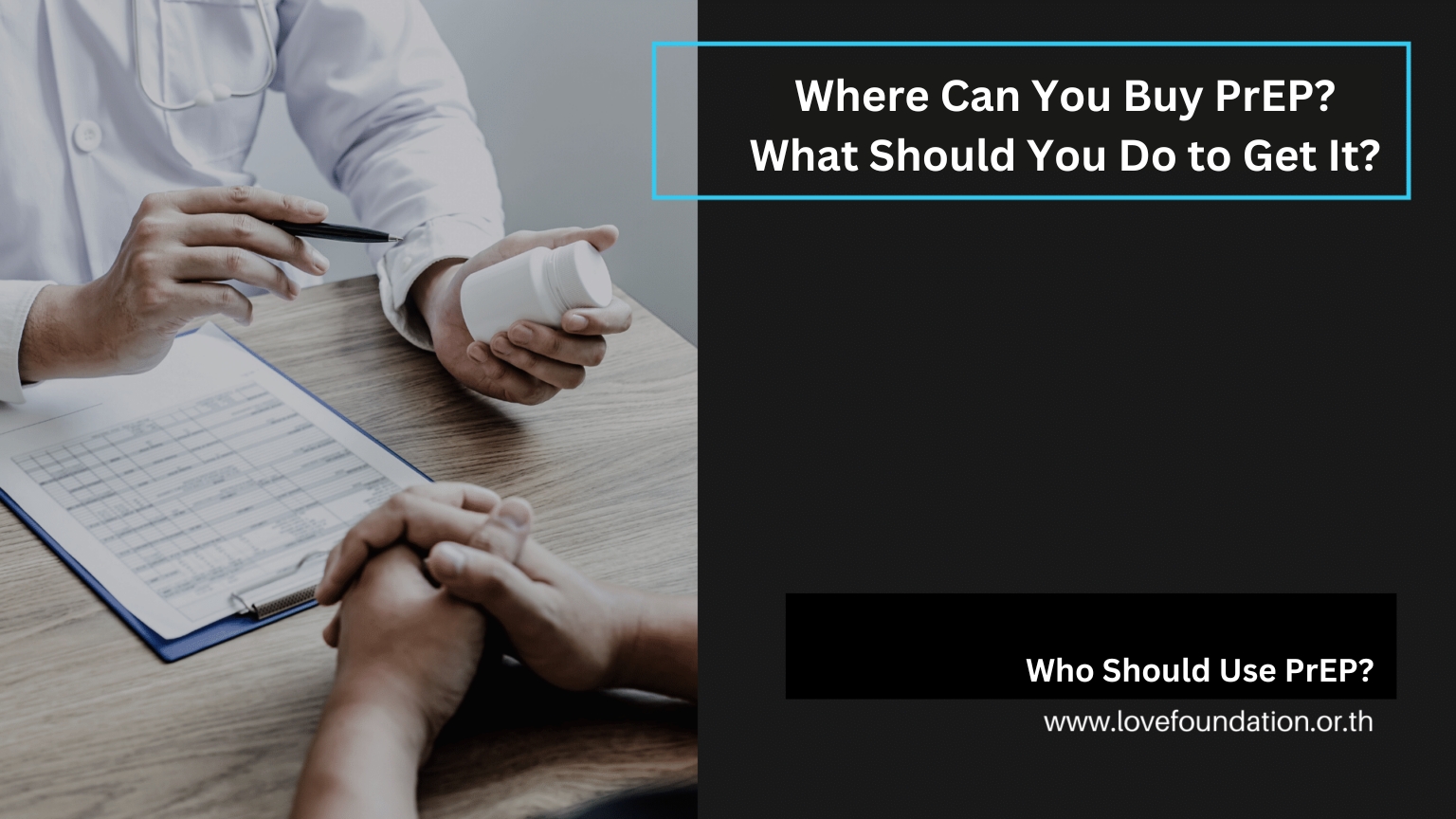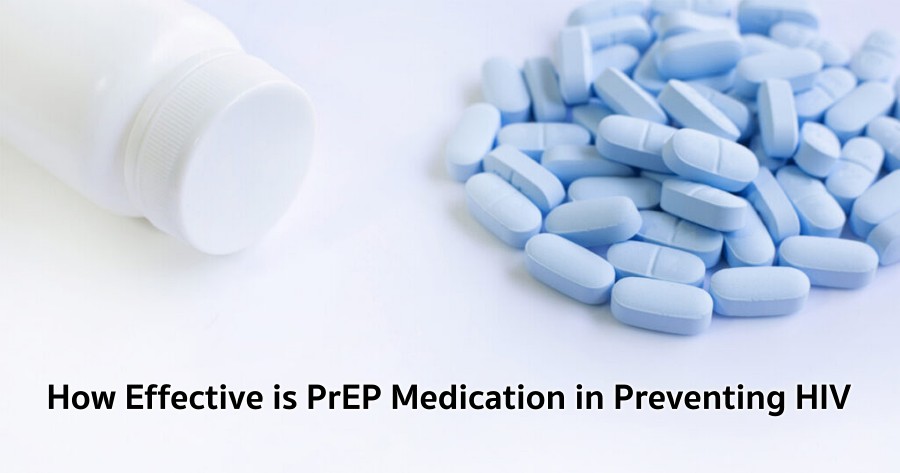PrEP medication or pre-exposure prophylaxis for HIV, has begun to play a significant role in sexual activities in today’s online era. This is due to a group of individuals with a high rate of partner turnover, facilitated by the ease of meeting new people through various social media platforms, which increases the risk of HIV transmission
How Does PrEP Medication Reduce the Risk of HIV?
PrEP, which stands for Pre-Exposure Prophylaxis, is a preventive HIV medication taken before potential exposure to the virus. It works by inhibiting the replication of HIV that may enter the body, preventing the virus from multiplying and allowing the body to eventually eliminate it.
Who Should Use PrEP?
Remember, PrEP is only for individuals who are HIV-negative. If you fall into any of the following risk categories, you should consult a doctor immediately to consider starting PrEP:
- Those who frequently change sexual partners
- Those who inject drugs
- Those who frequently have unprotected sex
- Those with HIV-positive partners
- Men who have sex with men
- Those working in sex services
- Those who have frequently used PEP (Post-Exposure Prophylaxis)]

Where Can You Buy PrEP? What Should You Do to Get It?
To start taking PrEP, you must contact a healthcare facility because a doctor will provide the correct guidance for using this medication. PrEP is not available over the counter at pharmacies or through online channels. Before starting PrEP, a general health check-up is required.
PrEP should be taken about 7 days before potential exposure and continued daily at the same time, similar to how birth control pills are taken, to ensure the body has a sufficient amount of the medication to protect against HIV. For those who can predict when they might be at risk, PrEP can be taken on-demand. This method involves taking the medication based on need, following a 2:1:1 regimen: take 2 pills 2-4 hours before the risk, take another pill 1 day after sex, and another pill 2 days after sex.
After starting the medication, the doctor will schedule a blood test to monitor the results after 1 month, and then every 3 months thereafter, to ensure you remain HIV-negative. If you no longer have any risk of HIV, you can stop the medication, but always consult your doctor first and have a blood test to confirm the effectiveness of the PrEP before discontinuing it.
Why Should You Still Use Condoms After Taking PrEP Medication ?
Although PrEP is highly effective at preventing HIV transmission, it cannot protect against other sexually transmitted infections (STIs) such as syphilis, gonorrhea, chancroid, genital warts, herpes, and others. Therefore, it is still necessary to use condoms every time you engage in sexual activity.
While PrEP can prevent HIV infection by over 90%, there remains a 10% chance of exposure to HIV from a partner whose status is unknown. Nothing is certain in sexual health, so using both PrEP and condoms together offers the greatest level of protection.
Where Can You Get PrEP?
Public Service Units For PrEP Medication
Northern Region
| Province | Name of Service Facility |
|---|---|
| Chiangmai |
|
| Nan |
|
| Payao |
|
| Phrae |
|
| Lampang |
|
| Maehongson |
|
| Lamphun |
|
| Uttaradit |
|
Bangkok
- Lerdsin Hospital
- Phumbol Adunyadet Hospital
- Vajira Hospital, Faculty of Medicine
- Vajiraphayaban Hospital, Navamindradhiraj University
- Vejkarunrasmi Hospital
- Klang Hospital
- Taksin Hospital
- Ladkrabang Hospital, Bangkok
- Luang Por Thaveesak Chutinathro Uthit Hospital
- Jaerngkrung Pracharak Hospital
- Public Health Service Center 3 – Bang Sue
- Public Health Service Center 4 – Din Daeng
- Public Health Service Center 9 – Prachathipatai
- Public Health Service Center 21 – Wat Thatthong
- Public Health Service Center 22 – Wat Pak Bo
- Public Health Service Center 23 – Si Phraya
- Public Health Service Center 25 – Huai Khwang
- Public Health Service Center 26 – Chao Khun Phra Prayurawong
- Public Health Service Center 28 – Krung Thon Buri
- Public Health Service Center 29 – Chuangnuchnet
- Public Health Service Center 36 – Bukkhalo
- Public Health Service Center 41 – Klong Toei
- Public Health Service Center 43 – Minburi
- Public Health Service Center 48 – Nakawatchara Uthit
- Public Health Service Center 61 – Sangwan Tasnarom
- Public Health Service Center 64 – Klong Samwa
- Chulalongkorn Hospital, Thai Red Cross Society
- Ramathibodi Hospital, Mahidol University
- Siriraj Hospital
- Rajpipat Hospital
- Sirindhorn Hospital
- Anonymous Clinic, AIDS Research Center, Thai Red Cross Society
- Pribta Tangerine Health Clinic
Central Region
| Province | Name of Service Facility |
|---|---|
| Kamphaeng Phet |
|
| Kanchanaburi |
|
| Phitsanulok |
|
| Phetchabun |
|
| Sukhothai |
|
| Chai Nat |
|
| Nakhon Sawan |
|
| Phichit |
|
| Nakhon Nayok |
|
| Nonthaburi |
|
| Pathum Thani |
|
| Phra Nakhon Si Ayutthaya |
|
| Ang Thong |
|
| Saraburi |
|
| Nakhon Pathom |
|
| Prachuap Khiri Khan |
|
| Phetchaburi |
|
| Ratchaburi |
|
| Samut Songkhram |
|
| Samut Sakhon |
|
| Samut Prakan |
|
Eastern Region
| Province | Name of Service Facility |
|---|---|
| Rayong |
|
| Chanthaburi |
|
| Chachoengsao |
|
| Chonburi |
|
| Trat |
|
| Prachinburi |
|
Northeastern Region
| Province | Name of Service Facility |
|---|---|
| Sa Kaeo |
|
| Kalasin |
|
| Khon Kaen |
|
| Maha Sarakham |
|
| Roi Et |
|
| Nakhon Phanom |
|
| Bueng Kan |
|
| Loei |
|
| Sakon Nakhon |
|
| Nong Khai |
|
| Nong Bua Lamphu |
|
| Udon Thani |
|
| Chaiyaphum |
|
| Nakhon Ratchasima |
|
| Buriram |
|
| Surin |
|
| Mukdahan |
|
| Yasothon |
|
| ศรีสะเกษ |
|
| อำนาจเจริญ |
|
| อุบลราชธานี |
|
South Region
| Province | Name of Service Facility |
|---|---|
| Krabi |
|
| Chumphon |
|
| Nakhon Si Thammarat |
|
| Phang Nga |
|
| Phuket |
|
| Ranong |
|
| Surat Thani |
|
| Pattani |
|
| Phatthalung |
|
| Yala |
|
| Songkhla |
|
| Satun |
|
Public Service Units Collaborating with the Community
You can contact and book an appointment for PrEP at this website: love2test.org/th/clinic
In summary, if you take PrEP consistently, it will be highly effective and safe in preventing HIV infection. However, the use of PrEP in Thailand remains relatively low, mainly due to a lack of knowledge or understanding about the condition and its costs. There are also other factors such as societal attitudes and the stress associated with using PrEP that need to be addressed. This will help increase the uptake of PrEP and reduce the spread of HIV in Thailand.
Overall, PrEP is a valuable tool in the fight against HIV in Thailand, and there should be increased efforts to enhance understanding and accessibility for high-risk groups.

